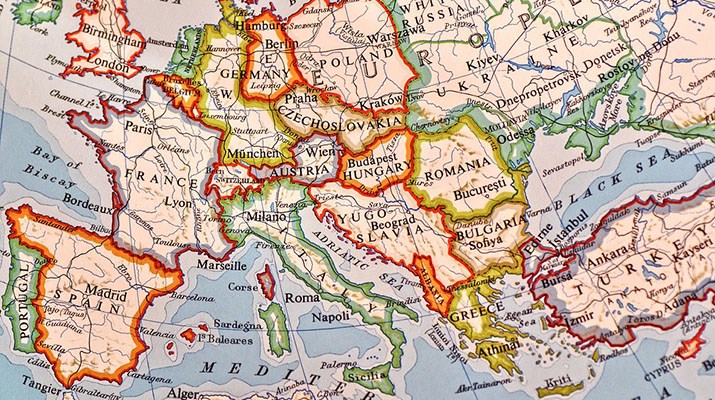
As Germany officially enters recession and the UK teeters on the edge of Brexit, investors could easily be forgiven for feeling cautious about the outlook for Europe. Even when taking a long-term view, it can be difficult to think beyond political strife, quantitative easing and slowing economic growth as US trade tariffs start to bite.
“But we would argue it has ever been thus in European equities; it has been volatile, and things can change relatively quickly,” says Sam Cosh, manager of the four-star rated European Assets Trust (EAT). His advice to investors? “Step away from the headlines, ignore the noise and focus on the reality.”
While Europe as a region remains firmly out of favour, Cosh and a number of other fund managers are finding plenty of opportunities on the continent. Olly Russ, head of European Income at Liontrust, says: “Europe deserves closer investigation; it offers the opportunity to invest in world-class companies whose products we use every single day.”
Hidden Gems
Cosh is looking for companies with strong business models and wide moats that protect them from the competition. He says: “Smaller companies in Europe have delivered extremely strong returns and they have been doing so in the face of challenging headlines and sentiment – we expect them to continue to do so.”
Among the top holdings in the trust, which has delivered annualised retuns of 9.8% over five years, is low-cost airline Wizz Air. It is benefiting from the rise in travel among its European customers – currently those who live in Central and Eastern Europe take an average of 0.4 flights a year each, compared to 1.8 flights a year taken by those in Western Europe.
While the airline industry has come under pressure of late from rising oil prices and concerns about the effect of Brexit, Wizz is at least shielded from some of the industry’s issues by the fact its workforce isn’t unionised and is therefore less likely to strike.
As well as that, the firm has the youngest fleet of planes in the industry, which means they are more efficient and cheaper to run, giving the firm more wiggle-room to cut prices and increase market share.
While Cosh says finding good companies in Europe is not a problem, he admits that finding ones whose shares are attractively valued is more difficult - quality stocks have become crowded and expensive. “You tend to have to look at places that other people don’t like,” he says.
One obvious hunting ground then is the financial industry, where the memory of the financial and sovereign debt crises still weigh heavy on investors’ minds. Danish bank Ringkjoebing Landbobank is another of the trust’s largest holdings and has been in the portfolio since the financial crisis. Its reputation for good service means it retains its customers, while its strict lending criteria means low default rates among the individuals and businesses it lends to. The bank is focused on a small geographic area, the Jutland region, where it has a 50% market share.
Ben Moore, co-manager of the Bronze-Rated Columbia Threadneedle European Select fund, says some of the best opportunities are in the “least sexy” businesses. One such example is laundry company Elis, which washes uniforms, tablecloths and bedsheets for businesses and hotels: “The firm has gradually gone around France buying up all the local laundry companies so now it is in a dominant position and no-one can compete.”
World-Leading Companies
It’s worth remembering, too, that Europe is home to some world-leading companies. Household names such as Kit Kat-maker Nestle and pharma giant Roche have long been favourites of investors in the region.
Moore says the key is to look for businesses with a strong brand and the ability to grow over the long-term. “What we spend most of our time obsessing about are all the things that can make a business survive, thrive or die,” he says.
Among his favourite investments are luxury goods firm LVMH, which is behind premier brands such as Moet Hennessy champagne and handbag maker Louis Vuitton. The company has a strong track record in acquiring new businesses to add to its stable and recently bought Germany suitcase firm Rimowa. “The company has raised its prices three times in recent months, and I think it will make a lot of money,” says Moore.
He also likes drinks firm Pernod Ricard as an example of how nurturing a brand can lead to strong returns. The company is behind drinks cabinet stalwarts including Absolut Vodka, Jameson Vodka and Beefeater Gin. Moore says: “The beauty is that these drinks cost almost nothing to make but the brand gives the company the ability to price the product at a premium. We call that an intangible asset – it can’t be replicated.”
Liontrust’s Russ points to elevator and escalator maker Kone as another example of a European-based world leader in its field. Set up in Helsinki in 1910, it now has more than 57,000 employees and annual sales of €9 billion. The firm is a major beneficiary of the global trend of urbanisation, with an estimated 200,000 people moving into cities every day across the world. Another favourite is Danone, the number one global provider of fresh dairy products, it is the company behind brands including Alpro and Activia yoghurts and Evian and Volvic water.
What are the Challenges?
Brexit and trade tariffs are just two major concerns facing European companies and investors alike, with both weighing on confidence and the already-softening economy. But Cosh thinks the risks of Brexit have already been largely priced into share prices, so is optimistic that good businesses will not be greatly affected.
He is more concerned about regulatory risks and, as such, has been avoiding real estate and utilities companies for some time – a decision which has caused the fund to underperform in the short-term.
Cosh thinks low interest rates are flattering the real estate industry while the utilities sector is vulnerable to any political or regulation changes, as well as being saddled with large amounts of debt. “These have been the two top performing sectors over the past year and it’s cost us dearly,” he says. “But we do believe avoiding them is the right thing to do in the long-term.”




























